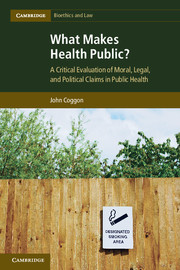 What Makes Health Public?
What Makes Health Public? from Part III - Tackling responsibility: liberal citizens as subjects and sovereigns
Published online by Cambridge University Press: 05 June 2012
A sweeping claim that ‘health is a public matter’ is as unhelpful as its counter; that ‘health is a private matter’. Health, and welfare more widely, touch on many issues – physical, behavioural, environmental – some of which can be argued to fall into the public sphere, others of which can not. There are many points of controversy, and it is not always clear which answers are definitively right. The role for analysts in public health law and ethics, and for policy-makers concerned about health issues, is to establish which things are public, to what extent, in what regard, and how and why this is so. We have seen repeated a point that can be missed when political paradigms present a ‘presumption of liberty’, suggesting that State inaction is ostensibly benign: States are accountable for their omissions as well as their acts. On one hand this means that States can not shirk responsibility for their failures. On the other, it means that every social determinant of health is under the State’s view, yet each is not ultimately the business of the State. It is for this reason that political analysis is essential: it is this that establishes which matters are of political concern, and the legitimate sources of political obligation.
Beyond the political arguments, any number of moral arguments may be made to individuals, advocating distinct practices in the name of health. There may be strongly felt moral imperatives about what people should do with, to, and for their minds and bodies. But where health is public, we go beyond moral argumentation, and seek to establish the role of the State in assuring or encouraging compliance with health-related imperatives, and the means it would use to do so. In one instance, compulsion may be recommended in response to a problem, in another no governmental action may be required whatsoever. In most cases, the regulatory structures will ‘nudge’ and persuade, rather than coercively direct.
To save this book to your Kindle, first ensure no-reply@cambridge.org is added to your Approved Personal Document E-mail List under your Personal Document Settings on the Manage Your Content and Devices page of your Amazon account. Then enter the ‘name’ part of your Kindle email address below. Find out more about saving to your Kindle.
Note you can select to save to either the @free.kindle.com or @kindle.com variations. ‘@free.kindle.com’ emails are free but can only be saved to your device when it is connected to wi-fi. ‘@kindle.com’ emails can be delivered even when you are not connected to wi-fi, but note that service fees apply.
Find out more about the Kindle Personal Document Service.
To save content items to your account, please confirm that you agree to abide by our usage policies. If this is the first time you use this feature, you will be asked to authorise Cambridge Core to connect with your account. Find out more about saving content to Dropbox.
To save content items to your account, please confirm that you agree to abide by our usage policies. If this is the first time you use this feature, you will be asked to authorise Cambridge Core to connect with your account. Find out more about saving content to Google Drive.